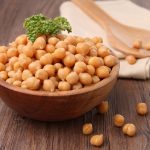4 surprising reasons to eat chickpeas
 (NaturalHealth365) Chickpeas, a familiar staple at salad bars, are customarily used to accent and complement a bowl of mixed greens. But these plump, beige little legumes shouldn’t be thought of as merely a garnish to be tossed into salads.
(NaturalHealth365) Chickpeas, a familiar staple at salad bars, are customarily used to accent and complement a bowl of mixed greens. But these plump, beige little legumes shouldn’t be thought of as merely a garnish to be tossed into salads.
Also known as garbanzo beans, chickpeas are gaining credibility as a true “superfood” – with research revealing that they are packed with disease-fighting micronutrients.
In fact, the diversity and power of the health benefits of chickpeas may surprise you. Here are four reasons to give chickpeas a regular place on your plate.
Lower your risk of gaining excess (unwanted) body weight
Chickpeas are high in dietary fiber – to the tune of 12.5 grams a cup (close to half of the recommended daily amount for adults). And, as you know, fiber provides a sense of satiety, or fullness, that may help prevent overeating and – in turn – contribute to weight loss.
By the way, for those scientifically oriented, research does seem to back up the ability of chickpeas to support a healthy body weight. In one 2016 study, participants who ate chickpeas regularly were 53 percent less likely to be obese – with lower body mass index and waist circumference than those who bypassed chickpeas.
In one intriguing Australian study, participants were told to eat their usual diet for four weeks, supplement with chickpeas for four weeks and then return to their customary diet for four weeks. The volunteers reported that they ate less, from all food groups, during the chickpea supplementation period – while at the same time feeling fuller and more satisfied.
Not only that, but they found themselves unconsciously eating smaller amounts of unhealthful, highly-processed “junk” foods during chickpea supplementation – even though they weren’t consciously trying to do so.
In other words, chickpeas could very well be a “secret weapon” against binge eating.
Chickpeas are good for your brain
A cup of chickpeas contains almost 70 mg of choline, a nutrient required for the production of acetylcholine (a neurotransmitter involved in mood, learning and memory). And, large observational studies have linked choline intake to improved brain function, sharper memory and quicker cognitive processing.
As it turns out, chickpeas may have anxiety-reducing and mood-lifting effects as well. They contain tryptophan, an amino acid which raises levels of a calming neurotransmitter known as serotonin.
By the way, a cup of chickpeas also contains 6 micrograms of selenium, an essential trace mineral. As deficiencies in selenium can increase the risk of age-related cognitive decline, it makes good sense for older adults to try to consume an adequate amount – defined by the Institute of Medicine as between 40 to 75 mcgs a day.
Can eating chickpeas really help to improve cardiovascular health?
The simple answer is: yes! When you eat chickpeas, you are doing your heart a real favor.
A cup of these legumes contains a whopping 280 mcg of folate, which is roughly three-quarters of the RDA. Also known as vitamin B9, folate works with vitamin B6 (also found in chickpeas) to help prevent the accumulation of homocysteine – an inflammatory amino acid associated with atherosclerosis and heart disease.
In addition, a controlled trial published in Annals of Nutrition and Metabolism showed that dietary supplementation with chickpeas for five weeks caused significant reductions in harmful LDL cholesterol – when compared with diets supplemented with wheat.
And, chickpeas are high in potassium, which supports healthy blood pressure.
Incidentally, the health benefits of chickpeas include antidiabetic properties. The American Diabetes Association recommends chickpeas as a source of dietary fiber to help lower blood sugar levels and reduce risk of type 2 diabetes.
Achieve long-lasting energy – plus, stronger muscle and bone
According to physical fitness experts, garbanzo beans make good workout buddies.
Chickpeas are increasingly making their appearance on lists of fitness superfoods that promote pre-workout energy while aiding post-workout muscle building and recovery. At 14.4 grams of plant-based protein per cup – and a modest 267 calories – chickpeas are a good source of nutrition for active people.
Plus, chickpeas’ high levels of antioxidants fight inflammation and help to protect the body from free radicals and oxidative stress – while the iron they provide helps with oxygen transport.
And, finally, chickpeas support bone health by supplying generous amounts of calcium and potassium.
Maximize health benefits of chickpeas with proper selection and preparation
Chickpeas are available in canned and dried form. Of course, if you opt for canned chickpeas, make sure to select a low-sodium brand.
Dried chickpeas should be rinsed well and soaked in cool water overnight in order to facilitate cooking and to remove ingredients that can cause digestive discomfort. They may then be simmered on a stove top for two hours until tender.
The mild, buttery taste of chickpeas combines well with various flavors, making them a perfect addition to many recipes. In addition to mixing cooked chickpeas into salads, you can add them to soups and stews. Or, serve them over rice to create a protein-rich side dish.
Of course, you can give chickpeas a starring role by using them to make a classic hummus dish. Simply blend them with extra virgin olive oil, chopped garlic, lemon juice and tahini.
Loaded with antioxidant vitamins, essential minerals, dietary fiber and protein, chickpeas have “all the right stuff” to support health, energy levels and well-being. Enjoy!
Sources for this article include:



